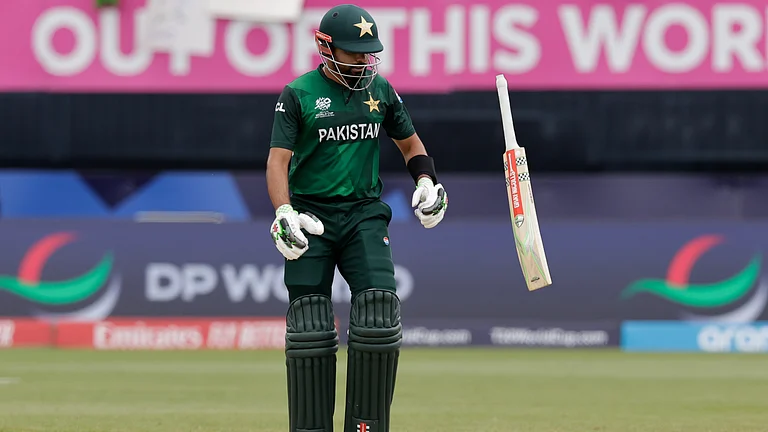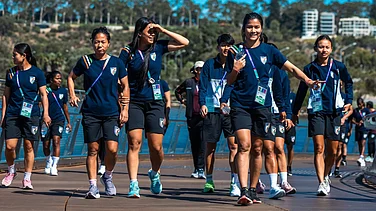The hands that wield a fiery Sunridges VA 900 bat now could have held a damp and dirty ‘pocha’. Many years ago, when Rinku Singh was a boy looking to contribute to his family’s scant earnings in Aligarh, he was offered the job of wiping floors at a coaching centre.
But everyone has a threshold. And while all work is precious, Singh turned down the job. Perhaps, he knew he was cut out for better things.
Today, thanks to his stellar performance in the IPL (14 matches, 474 runs, strike rate of almost 150), Singh has not only added to his fairy tale, he is also being talked about as a candidate for the finisher’s role in the Indian team.
Singh’s is a classic story of an underdog beating the odds and emerging triumphant. And his vehicle has been the IPL, as it has been for so many players over the years. Singh has made in the region of Rs 4.5 crore from the tournament over the last six years, an unimaginable sum for the family once. Before him, Hardik and Krunal Pandya, Nathu Singh, T Natarajan, Mohammed Siraj were some of the players whose lives were transformed by the league.
“Only cricket could get me ahead. I didn’t have another option,” Singh admitted in an interview.
Everyone knows by now that Singh’s father, Khanchandra, delivered LPG gas cylinders. Not many know that the man’s five sons, at least some of them, had to help him at times.
“There have been days when we have carried two cylinders on one bike to deliver to local eateries or to people’s homes,” Singh said, the pain of those years still apparent in his words. There also were beatings from his father, who wanted Rinku to study, not play.
But it was the game that jazzed the boy’s soul. His mother, Vina Devi, realized it and did whatever she could. Once, Singh had to go to Kanpur for a tournament. His mother borrowed Rs 1000 from a shop and gave it to him.
Singh performed well at the tournament and kept doing so wherever he played. He climbed through the ranks quickly. By 16, he was a UP player. At 19, he was playing in the Ranji Trophy.
Father-son relationship underwent a mature shift, like in the film ‘Gully Boy’.
“There was a tournament in Aligarh once. Papa came to watch it. I was named Player of the Tournament and was awarded a bike,” Singh says. “After that, Papa never hit me.”
*****
Yashasvi Jaiswal, 21, confidently steps off the Rajasthan Royals team bus in designer casuals today. But not too long ago, he was sleeping in the Muslim United Club tent at Mumbai’s Azad Maidan, and earning a livelihood by working in a dairy, and then briefly at a paani-puri stall.
Jaiswal is from Bhadohi, Uttar Pradesh. Noticing his cricketing talent, his father brought him to Mumbai for coaching and schooling when he was just nine or ten and left him with his uncle. But that was a temporary arrangement, and the boy had to fend for himself after a while. Muslim United gave him shelter in their tent, provided he played well.
Away from home and parents, Jaiswal had to grow up quickly. While he missed his family and hometown, he also began to enjoy his freedom and process of self-discovery. He would eat at Khau Galli and take up ancillary jobs on the maidan, such as umpiring and rolling pitches. That brought extra pocket money.
“People say struggle, but for me, it was a good life,” Jaiswal said in an interview. “And it has given me a lot — independence, the ability to look after myself, a fighting spirit, finding ways out of hard situations. So, sometimes when I don’t play well, or I’m down, I know how to accept it, absorb it.”
Jaiswal’s somewhat haphazard Mumbai plan got the necessary direction when in 2013, he was spotted by coach Jwala Singh, who had an academy in Santacruz. Singh also provided the youngster with a roof over his head. Two years later, Jaiswal set an all-round record in school cricket, scoring 319 not out and taking 13/99 over two innings in the Giles Shield. Spots in the Mumbai and India age group teams followed. Those then led to the senior Mumbai team. And in the 2020 IPL auction, he was bought by Rajasthan Royals for Rs 2.4 crore. This year, his pay was Rs 4 crore. In all, Jaiswal is estimated to have made Rs 12. 8 crore from the IPL. Not bad for someone who once sold paani-puri.
*****
Mohammed Siraj’s father Mohammed Ghaus drove a rickshaw in Hyderabad while his mother Shabana Begum was a maid and homemaker. The 29-year-old is proof of three things. Poverty can be overcome. It’s never too late to pick up a sport (within reason). And that talent exists at every dusty maidan of the country.
It beggars belief that till 2015, when he was almost 21, Siraj had not bowled with a cricket ball. He had only played with a tennis or rubber ball. It’s equally amazing that just a few months after first bowling with a cricket ball, he was playing for Hyderabad in the Ranji Trophy. Then, in the 2016-17 season, he took 41 wickets for his state team, and that helped him get an IPL contract worth Rs 2.6 crore from Sunrisers Hyderabad. India debuts in all formats followed at regular intervals. As of this year, Siraj, now with Royal Challengers Bangalore, has earned an estimated Rs 27 crore from the IPL.
Looking back on his journey, Siraj said, “As a child, I used to bowl in slippers because I did not have shoes.”
He is glad he did not get a chance to take formal coaching. He feels he is a far more natural player due to that, rather than someone obsessed with technical details.
People look at the riches of IPL players, but they have struggles too. As Siraj’s career bloomed, his father’s health declined. It then worsened just when Siraj was miles away in Australia, about to make his Test debut. One day on the phone, Mohammed Ghaus told his son, “Don’t worry about me, you do your job and make the country proud. When you come back home, we’ll chat and have a meal together.”
It was not to be. Mohammed Ghaus passed away. What made the moment doubly hard for Siraj was that he was in quarantine, alone in his room.
“I don’t know how I survived those 14 days,” he said. “I thought of coming back. The BCCI also asked me if I wanted to go back. But my dad would have wanted me to play, so I stayed.”
But at least Mohammed Ghaus eased into the long sleep knowing that all his years driving a rickshaw had helped make one of his son’s an engineer, and the other a top cricketer.
Meanwhile, in Hyderabad, they still treat Siraj as one of their own. Siraj laughed in the interview about the way people continue to address him in Hyderabadi slang. “They think, Siraj abhi bhi vaise-ich hai,” he said. (Siraj is still that same guy from the streets.)
He is, and he isn’t. The IPL, like MBA, IAS or KBC, has become that gold-dusted acronym that hands the keys to the Promised Land, provided you have skill, determination and a little bit of luck.





















